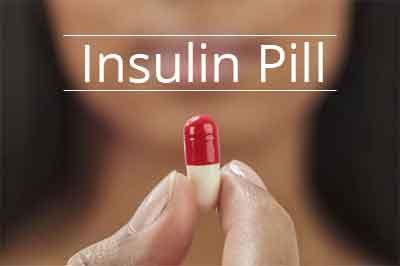- Home
- Editorial
- News
- Practice Guidelines
- Anesthesiology Guidelines
- Cancer Guidelines
- Cardiac Sciences Guidelines
- Critical Care Guidelines
- Dentistry Guidelines
- Dermatology Guidelines
- Diabetes and Endo Guidelines
- Diagnostics Guidelines
- ENT Guidelines
- Featured Practice Guidelines
- Gastroenterology Guidelines
- Geriatrics Guidelines
- Medicine Guidelines
- Nephrology Guidelines
- Neurosciences Guidelines
- Obs and Gynae Guidelines
- Ophthalmology Guidelines
- Orthopaedics Guidelines
- Paediatrics Guidelines
- Psychiatry Guidelines
- Pulmonology Guidelines
- Radiology Guidelines
- Surgery Guidelines
- Urology Guidelines
Oral insulin pill- the future of diabetes treatment is almost here

Insulin injections may soon become a thing of the past as the researchers at the Harvard John A. Paulson School of Engineering and Applied Sciences (SEAS) have developed an oral delivery method for insulin that could drastically transform the paradigm for diabetes treatment. It is a new hope for people with type 1 diabetes for whom taking painful needle prick once or twice daily is the only method for delivering insulin.
The research was published in the journal Proceedings of the National Academy of Sciences.
Samir Mitragotri, Hiller Professor of Bioengineering and Hansjorg Wyss Professor of Biologically Inspired Engineering at SEAS, and colleagues report the development of a highly effective oral insulin formulation using choline and geranate (CAGE) ionic liquid that significantly insulin absorption by efficiently circumventing the gastrointestinal barriers.
Not only does oral delivery of insulin promise to improve the quality of life for up to 40 million people with type 1 diabetes worldwide, it could also mitigate many of the life-threatening side effects of diabetes that result from patients failing to give themselves required injections.
Read also: Updated Type 1 Diabetes Treatment Guidelines of ADA
Insulin therapy, by injection just under the skin or delivered by an insulin pump, generally keeps the glucose levels of most diabetics in check. "But many people fail to adhere to that regimen due to pain, phobia of needles, and the interference with normal activities," said Dr. Mitragotri. "The consequences of the resulting poor glycemic control can lead to serious health complications."
Finding a way to deliver insulin orally has been elusive; the protein does not fare well when it encounters the stomach's acidic environment and it is poorly absorbed out of the intestine. The key to the new approach is to carry insulin in an ionic liquid comprised of choline and geranic acid that is then put inside a capsule with an acid-resistant enteric coating. The formulation is biocompatible, easy to manufacture, and can be stored for up to two months at room temperature without degrading, which is longer than some injectable insulin products currently on the market.
"Once ingested, insulin must navigate a challenging obstacle course before it can be effectively absorbed into the bloodstream," said Mitragotri. "Our approach is like a Swiss Army knife, where one pill has tools for addressing each of the obstacles that are encountered."
By encapsulating the insulin-ionic liquid formulation in an enteric coating, the team overcame the first obstacle, resisting breakdown by gastric acids in the gut. This polymer coating dissolves when it reaches a more alkaline environment in the small intestine, where the ionic liquid carrying insulin is released.
"When a protein molecule such as insulin enters the intestine, there are many enzymes whose function is to degrade the proteins into smaller amino acids," explained first author Amrita Banerjee, who conducted the research while working as a postdoctoral fellow in Mitragotri's lab, and is now an assistant professor at North Dakota State University. "But the ionic liquid-borne insulin remains stable."
The choline-geranic acid formulation also was shown to be adept at penetrating two final barriers - the layer of mucus lining the intestine and the tight cell junctions of the intestine wall, through which large-molecule drugs such as insulin cannot easily pass.
Other researchers have tried various means of surmounting these barriers - by re-engineering the insulin molecule, coating it in protective polymers, and introducing additives to inhibit breakdown by enzymes or to enhance absorption. However, no oral insulin delivery product is currently available in the clinic.
Orally ingested insulin would more closely mimic the way in which a healthy individual's pancreas makes and delivers insulin to the liver, where up to 80 percent is extracted and the rest is circulated through the bloodstream. It could also mitigate the adverse effects of taking injections over a long period of time.
Read Also: Dulaglutide as effective as insulin glargine in diabetes with CKD : Lancet
Banerjee also noted that ionic liquid-borne insulin can be prepared in a one-step process that could be readily scaled up for inexpensive industrial production, making the cost of manufacturing the oral formulation easily manageable.
Mitragotri next plans to conduct more animal tests of the formulation as well as long-term toxicological and bioavailability studies. The researchers are optimistic that if all goes well, gaining approval for eventual clinical trials in humans will be made easier by the fact that the key ingredients in their ionic liquids - choline and geranic acid - are already considered safe.
For more information click on the link: https://doi.org/10.1073/pnas.1722338115

Disclaimer: This site is primarily intended for healthcare professionals. Any content/information on this website does not replace the advice of medical and/or health professionals and should not be construed as medical/diagnostic advice/endorsement or prescription. Use of this site is subject to our terms of use, privacy policy, advertisement policy. © 2020 Minerva Medical Treatment Pvt Ltd